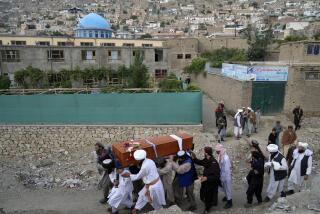Suicide Bomber Kills 33 in Iraq
- Share via
BAGHDAD — A suicide bomber jumped onto a crowded bus as it was leaving a Baghdad terminal for a predominantly Shiite Muslim city Thursday and blew himself up, killing 33 people and wounding 25, police and witnesses said.
The blast engulfed the bus in flames, charring many of the 45 passengers in their seats. Others managed to escape in panic, their clothes on fire. Debris tore through nearby restaurants and food stalls, leaving midday diners and vendors bloodied. All of those killed were on the bus.
It was the country’s deadliest incident on a day when a Sunni Arab insurgent group claimed to have killed a U.S. security consultant being held hostage. A separate bombing Thursday struck an American convoy in Baghdad, killing a U.S. soldier, one day after a similar blast killed a Marine in Ramadi, the military said.
Sectarian violence in Iraq had already been rising in the run-up to Thursday’s parliamentary election. The bus bombing increased the three-day death toll from suicide attacks in the capital to at least 75.
The assault was clearly aimed at Shiites, the majority religious sect whose main political parties lead the government, and triggered a furious response. No group claimed responsibility for the bombing.
Nahda terminal is the capital’s main hub for buses to and from Iraq’s Shiite heartland in the south. The targeted bus was stopped at the exit, about to turn onto a highway, when a man carrying a bag suddenly jumped through the open door.
“The conductor tried to stop him, telling him that the bus was full,” recalled Badr Abdul Ridha, 22, who was working in a restaurant a few yards away. He said he saw the bomber pushing ahead when the bomb went off.
“Flames immediately came out of the vehicle,” said Ala Hassani, who was working in the same restaurant and was cut on the head and arms. “People trapped inside were burning.”
Firefighters and bystanders pulled bodies from the wreckage and loaded them into ambulances. Suitcases, shoes, fruit from lunch bags, and shreds of clothing lay scattered amid the smoking ruins. ID cards identified five of the dead as a couple and their three children from Nasiriya, the bus’ destination, 200 miles south of here.
Many passengers were headed to Nasiriya for the weekend, which in Iraq starts Thursday evening.
As a crowd gathered at the wreckage, reaction to the tragedy spilled into the political campaign. A set of campaign posters was pulled from the debris, unfolded, and found to be mostly undamaged. They were for the United Iraqi Alliance, the main Shiite coalition, No. 555 on next week’s ballot.
“They want to stop us from electing slate 555,” said a young man, showing the posters to television cameras. “But no, by God, they cannot!”
“They are mistaken if they think they will rule Iraq again,” said Haider Kinani, who sells clothes from a shop nearby. He was referring to Sunni insurgents loyal to deposed President Saddam Hussein. “Why are they afraid of the ballot box?”
Several Sunni parties are running, and Iraqi and U.S. officials hope that a large turnout of the nation’s Sunni minority will help curb the violence. On Thursday, Sheik Faris Dulaimi, a prominent Sunni political figure, denounced the bus bombing as a terrorist attempt to provoke all-out sectarian warfare.
As the election approaches, the insurgents have been relentless. On Tuesday, Baghdad’s main police academy was bombed, killing at least 40 people. Insurgent groups have also targeted the Western community in Iraq with a spate of kidnappings in the past two weeks, seizing two Americans, two Canadians, a Briton, a German and a Frenchman in four incidents.
On Thursday, the Islamic Army in Iraq said in an Internet posting that it had killed “the American security consultant for the Housing Ministry” after the United States failed to respond to its demand for the release of Iraqi prisoners.
The statement did not name him or provide photos. But a video issued by the militant group Tuesday had identified the hostage as Ronald Alan Schulz, 40, an industrial electrician from Alaska, and threatened to kill him unless all prisoners in Iraq were freed.
Thursday’s report was the first that any of the seven Western hostages had been killed. If confirmed, it would be the first known slaying of an American held by the insurgents in 15 months.
White House Press Secretary Scott McClellan said he could not confirm the death of the American hostage.
*
Special correspondent Asmaa Waguih contributed to this report.
More to Read
Sign up for Essential California
The most important California stories and recommendations in your inbox every morning.
You may occasionally receive promotional content from the Los Angeles Times.












